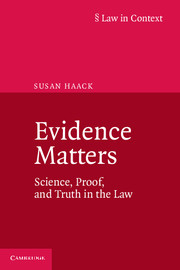Book contents
- Frontmatter
- Epigraph
- Contents
- Acknowledgments
- Introduction: A Pragmatist Perspective on Science, Proof, and Truth in the Law
- 1 Epistemology and the Law of Evidence
- 2 Epistemology Legalized
- 3 Legal Probabilism
- 4 Irreconcilable Differences? The Troubled Marriage of Science and Law
- 5 Trial and Error
- 6 Federal Philosophy of Science
- 7 Peer Review and Publication
- 8 What’s Wrong with Litigation-Driven Science?
- 9 Proving Causation
- 10 Correlation and Causation
- 11 Risky Business
- 12 Nothing Fancy
- Cases Cited
- Statutes, etc., Cited
- Bibliography
- Glossary
- Index
- References
11 - Risky Business
Statistical Proof of Specific Causation
Published online by Cambridge University Press: 05 August 2014
- Frontmatter
- Epigraph
- Contents
- Acknowledgments
- Introduction: A Pragmatist Perspective on Science, Proof, and Truth in the Law
- 1 Epistemology and the Law of Evidence
- 2 Epistemology Legalized
- 3 Legal Probabilism
- 4 Irreconcilable Differences? The Troubled Marriage of Science and Law
- 5 Trial and Error
- 6 Federal Philosophy of Science
- 7 Peer Review and Publication
- 8 What’s Wrong with Litigation-Driven Science?
- 9 Proving Causation
- 10 Correlation and Causation
- 11 Risky Business
- 12 Nothing Fancy
- Cases Cited
- Statutes, etc., Cited
- Bibliography
- Glossary
- Index
- References
Summary
The law embodies the story of a nation’s development through many centuries…. In order to know what it is, we must know what it has been, and what it tends to become. We must alternately consult history and existing theories of legislation. But the most difficult labor will be to understand the combination of the two into new products at every stage. The substance of the law at any given time pretty nearly corresponds, so far as it goes, to what is then understood to be convenient; but its form and machinery, and the degree to which it is able to work out desired results, depend very much upon its past.
–Oliver Wendell Holmes.A PRAGMATIST PREAMBLE: HOW LEGAL CONCEPTS EVOLVE
This paper may not be what you were expecting; at least, if you were anticipating that I would come up with a new analysis of the concept of causation that I could apply in legal contexts, or even with a new critique of Hart and Honoré’s ideas, or a new defense of them, I shall have to disappoint you. Why so?–not because I have tried, but failed, to contribute something to this analytic genre of legal philosophy; rather, because I’m inclined to think it’s more productive to tackle questions about causation, risk, and responsibility in the law in a somewhat different way, better suited to highlighting two facts that seem, at least where the common law is concerned, undeniable: first, that legal concepts generally diverge, in greater or lesser degree, from the everyday concepts in which they have their roots; and second, as Holmes emphasized, that legal concepts aren’t fixed and static, but gradually shift and evolve as social values and priorities change, as new discoveries are made, and as new technology is introduced.
- Type
- Chapter
- Information
- Evidence MattersScience, Proof, and Truth in the Law, pp. 264 - 293Publisher: Cambridge University PressPrint publication year: 2014

